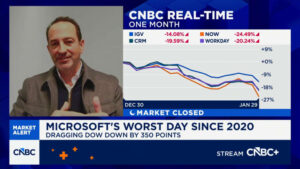I’m looking for the best-value dividend stocks to buy for my portfolio before this week’s Stocks and Shares ISA deadline. And I think HSBC Holdings (LSE:HSBA) might be one of the most attractive FTSE 100 bargain stocks to buy right now.
Today the blue-chip bank trades on a forward price-to-earnings (P/E) ratio of 5.5 times. It also trades on a forward price-to-earnings growth (PEG) ratio of 0.1, based on projections that earnings will soar 69% in 2023.
Any reading below one indicates that a stock is undervalued.
On top of this, HSBC’s share price currently carries a huge 8.3% dividend yield. But do the risks of investing in the bank make it a FTSE 100 share to avoid?
The risks
Profits at banking businesses like HSBC are in enormous danger as inflationary pressures deflate.
Why? Because central banks keep rates higher during periods of significant price rises. And the higher interest rates are, the more money retail banks make on their lending activities.
This week Silvana Tenreyro — who sits on the Bank of England’s rate-setting Monetary Policy Committee — said that the current benchmark rate might “require an earlier and faster reversal” as signs grow that inflation could fall below policy-makers’ targets.
Speculation is growing that central banks globally could reduce rates more sharply than expected as inflation tempers. Their appetite to cut could be strengthened if the global economy struggles for momentum.
Higher rates helped HSBC’s net interest margin (NIM) rise more than a quarter of a percent in 2022, to 1.48%. The NIM measures the difference between the interest banks charge borrowers and what they offer to savers. This in turn pushed revenues 4% higher to $51.7bn.
Lower rates pose a threat to HSBC and its peers’ ability to grow profits in the near term, then. But I still believe the potentially explosive benefits of buying the FTSE 100 bank outweigh the risk of sharper-than-expected interest rate rises.
The rewards
More specifically, I think HSBC’s pivot towards Asia could deliver huge long-term returns to investors.
The business is cutting its exposure to slower-growing developed territories as it turbocharges investment in its emerging regions. Its latest move in November saw it sell its Canadian operations for $10.1bn in a move that will give it more financial clout for expansion in Asia.
It has already vowed to spend $6bn over the next five years to expand its operations in China, Hong Kong, and Singapore. Moves to expand its presence in areas like wealth management could prove highly profitable as wealth levels in Asia boom.
Financial services giant BBVA reckons the continent will be responsible for 65% of global economic growth by 2027. Despite the problem of rising competition, HSBC could make terrific profits against this backdrop. It certainly has the financial firepower and the brand strength to make the most of this opportunity.
If I have spare cash to invest I’ll be looking to add HSBC shares to my portfolio.
This post was originally published on Motley Fool







